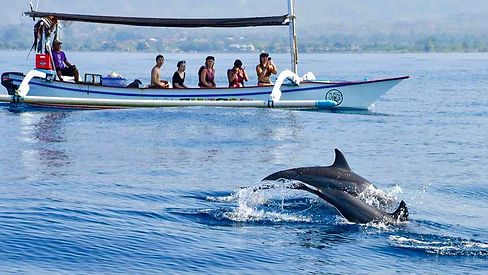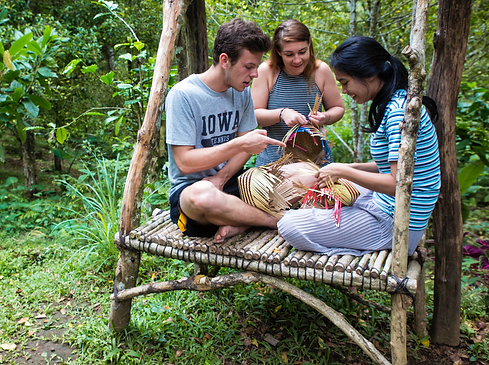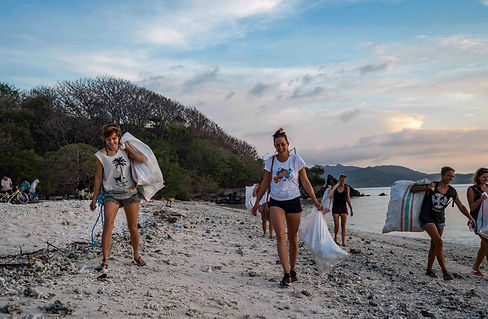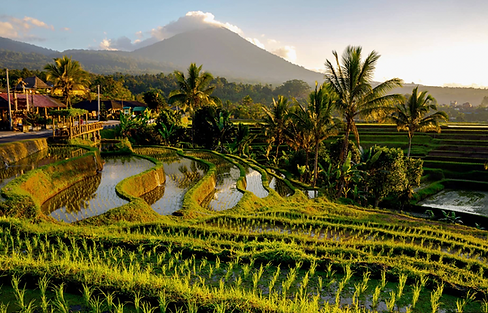
BALI & INDONESIA
Dolphin Boat Trip
Dolphin watching in Lovina is a magical experience, but it must be done responsibly. We work closely with our boat drivers and operators to ensure our dolphin boat trip follows ethical best practices. This includes maintaining a respectful distance from the dolphins to prevent stress while still allowing guests to witness these beautiful creatures in their natural habitat.
We are also working with the local community and authorities to establish best practices and regulations for other boat operators.


Homestay Visit in Bali
A visit to Gede and Putu’s home offers groups an authentic insight into Balinese traditional farming life. Gede guides our groups through his plantation, sharing knowledge about different crops and sustainable farming techniques. Afterwards group members can unwind with a coffee facial before sitting with Putu, a champion bamboo basket weaver, to learn about the cultural significance of bamboo in Bali.
Group members are encouraged to try weaving their own baskets or purchase one to support the family’s business. The experience ends with a delicious homemade buffet dinner prepared using fresh, organic ingredients from the family’s land and their neighbours’ plantations - an excellent way to support the local community.
Gili T Beach Clean-up
If our groups are on Gili T on a Friday, they have the chance to take part in Gili Eco Trust’s beach clean-ups, an initiative that keeps Gili T’s beaches pristine and protects marine life.
This hands-on experience is an opportunity for group members to directly contribute to environmental conservation whilst learning about the impact of plastic pollution. As a small thank you, all group members are rewarded with a refreshing beer or soft drink at the end of the clean-up, reinforcing the idea that sustainability can be both rewarding and social.


Jatiluwih Rice Fields
Jatiluwih Rice Fields are a UNESCO World Heritage Site, and our visits directly support local farmers. 100% of the entrance fee goes back to the community, ensuring farmers receive a fair wage and that their land remains protected from commercial development.
While exploring the fields our groups have the opportunity to visit a local family’s stall, where they can purchase rice and handmade rice-based snacks. Encouraging guests to support these small businesses helps sustain traditional farming and reinforces the importance of ethical tourism.
Temple Visits
Our temple visits immerse group members in Balinese spirituality and traditions. At each temple, group members receive a blessing from a priest and learn how to create canang sari, the small, intricate offerings seen throughout Bali. The local guide explains their cultural significance, deepening guests' understanding of Balinese Hinduism.
Group members also participate in a Bahasa Indonesia language lesson, equipping them with basic phrases to connect more meaningfully with locals. These experiences encourage cultural respect and give group members a richer appreciation of Bali’s spiritual heritage.


Ende Sasak Village
On our Epic Indonesia trip this cultural experience offers a rare glimpse into the unique traditions of the Sasak people in Lombok, providing a stark contrast to Balinese culture. Led by a local guide, Yoga, guests learn about the Sasak way of life, from traditional house construction to daily customs. They witness an impressive martial arts demonstration, try their hand at sarong-making, and hear firsthand how the Sasak people sustain their livelihoods. This visit fosters a deeper cultural appreciation and supports local artisans, ensuring that their traditions continue to thrive.
Gede and his family
“When we first visited this homestay in Bali back in 2012 it was very basic. Gede was a farmer, and his wife weaved
and sold baskets and their 3 children didn’t have many opportunities to do something different. By bringing our groups here it has changed their lives and they can now afford to send their daughter to university to do a Business Studies degree.
Which will change her future and the lives of future generations of her family.”
